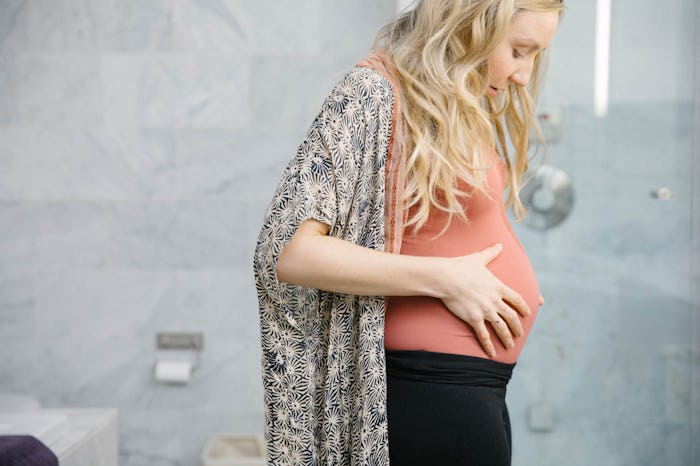Life
This Is How To Have A Healthy Twins Pregnancy, According To Science
Being pregnant is a time filled with such hope and joy, and finding out you're pregnant with twins multiplies that excitement — but it also multiplies the stress. You may be unsure of how this pregnancy differs from a single pregnancy, or how high risk it actually is. So what precautions do you need to take if you're pregnant with twins? There are definitely a few, but it's not as complex as you might assume.
The rates for multiple births are higher than ever. In 2014, there were 33.9 twin births for every 1000 births in the United States alone, reported CNN — the rate has jumped over 75 percent since 1980. The reason for the increase is hypothesized to be related to the increasing gestational age of mothers and prevalence of in-vitro fertilization used to become pregnant, according to the March of Dimes.
Thankfully, with the increase in multiple birth comes an increase of knowledge on how to treat pregnant women and keep them healthy throughout the duration of their pregnancies and after the delivery. According to the American Academy of Pediatrics (AAP), while being pregnant with twins does classify you as a high-risk pregnancy, it doesn't have to be a terrifying diagnosis. According to the AAP, this just means they're going to provide you with a bit more care, and give you a few more rules than moms of singleton babies. What precautions do you need to take if you're pregnant with twins?
The first precaution is actually kind of boss. While women who are pregnant with one child will need to consume an additional 300 calories per day to safely grow their pregnancy, women who are pregnant with twins need an additional 1000 calories per day in their diet, according to the AAP. Yes, these should be coming from healthy foods which are high in water and iron, given the fact that women who are pregnant with twins are more likely to experience dehydration and anemia than typical pregnant mothers, noted the March of Dimes. However, it's fun to know if you're craving a slice of cheesecake, that it fits neatly into your daily calorie allowance. How often does that happen? Marathon training and multiple pregnancy — that's pretty much it.
But it's also important to know that women who are pregnant with multiples are more likely to develop gestational diabetes than those who are just having one, according to the March of Dimes. The AAP recommended that most twin moms don't need an additional prenatal vitamin — one per day is sufficient — but they need to pay extra attention to their water intake as they are more likely to become dehydrated, and that dehydration can lead to nasty side effects like leg cramping and diarrhea. I had terrible leg cramps when I was pregnant, and I wouldn't wish those on anyone. To be fair, though, I am also truly terrible at getting enough water.
Be sure to also take that vitamin with some food to try to hold off any nausea. Women who are pregnant with multiples are more likely to experience extreme morning sickness than those who aren't, noted the AAP. Try to make the food you eat as nutrient dense as possible — particularly iron, calcium, and protein, just to make sure you get all you need.
Unfortunately, the biggest concerns of a multiple pregnancy — preterm labor and preeclampsia — aren't well thwarted by anything the mother does early in her pregnancy. As your pregnancy continues, your provider will keep a close eye on your blood pressure and cervix to determine what needs to be done, if anything at that time. However, most women can enjoy a mostly normal and healthy pregnancy with twins, with most moms able to exercise and even maintain a satisfying sex life during a large part of their pregnancies, according to Obstetrics and Gynecology. It's all a matter of what your doctor says that you can and cannot do.
As you progress further and further into your pregnancy, it's likely your activities will be restricted a bit more than moms of singleton pregnancies, noted the Mayo Clinic. You'll also need to be cognizant of your body a bit more than the average mother. Because of your risk status with preeclampsia, you need to call your provider if you're noticing frequent or intense headaches, rapid weight gain, or sudden nausea, as they all point to a blood pressure emergency, according to the AAP.
In all likelihood, you're already doing all you can for your little ones. While your wings may be clipped a bit later on in your pregnancy, it's still a wonderful, miraculous, and yes, overwhelming time. Keep a line of communication open with your provider, drink that water, eat those nutrients, and buy double the onesies.
